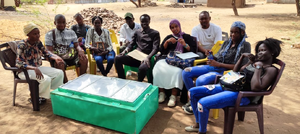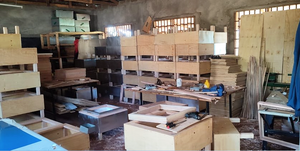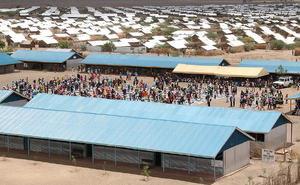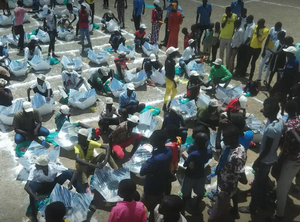Tom Sponheim (talk | contribs) m (→External links) |
(Haines solar cooker project at Kakuma has been canceled) |
||
| (95 intermediate revisions by 4 users not shown) | |||
| Line 1: | Line 1: | ||
{{GoogleTranslateLinks}} |
{{GoogleTranslateLinks}} |
||
| + | {{Updated|1|29|24}} |
||
| + | [[File:May 2017 - Kakuma refugee camp setting the pace in use of renewable energy|thumb|right|335 px|"Kakuma refugee camp could be setting the pace to encouraging the use of clean renewable energy not only in Kenya but the whole continent. This is after they were introduced Solar cookers that depend on sun in cooking. In the recent years, the importance of shifting to clean renewable energy has been dominating both International and Local News. NTVs Sharon Barang'a was in Kakuma and now reports how the initiative is expected to cut reliance on firewood and charcoal by half therefore honouring the principles of Geneva conventions."]] |
||
| ⚫ | [[Solar Cookers International]]’s first and largest refugee project began in January 1995 in the '''Kakuma Refugee Camp''' located in [[Kenya]]. At the time, the camp provided a safe haven for 28,000 refugees, primarily from [[Sudan]] and [[Somalia]]. The camp also housed refugees from [[Ethiopia]], the [[DRC]], [[Burundi]], [[Eritrea]], [[Rwanda]] and [[Uganda]]. Kakuma had considerable refugee turnover, but by 2004, when Solar Cookers International (SCI) concluded the project, the camp had tripled in size to nearly 90,000 refugees. Though rapid growth posed problems for assisting all those who wanted to solar cook, SCI ultimately served over 15,000 families. Beginning in 2016, [[#News|new efforts]] have been made to bring solar cooking back to Kakuma. |
||
| + | {{NewAug22}}[[Solar Cookers International]] began partnering with the [[Ecomandate|Ecomandate Foundation]] in late 2018 at the [[Kakuma Refugee Camp]] in Kenya, to bring solar cooking to Kakuma families. Ecomandate brings experience, expertise, and knowledge of local customs and cooking habits to this effort. Ecomandate oversees the construction and distribution of solar cookers to residents. They implement training and follow-up to ensure successful continued use of the solar cookers. Over 1,900 Kakuma residents are now enjoying nutritious solar-cooked meals. From 2019 until mid-2022, 234 box solar cookers have been constructed in Kenya by residents, with locally sourced materials, for use by Kakuma families. |
||
| + | It is estimated that these solar cookers will avoid 5,229 metric tons of carbon dioxide over the cookers’ expected lifetime of 15 years. Solar cooking allows Kakuma residents to breathe cleaner air, drink safer water, and experience increased safety and opportunities for women and children. Efforts to increase the use of solar cookers continue in Kakuma and these impacts and figures will grow. |
||
| ⚫ | |||
| + | ::<gallery widths="300" spacing="small"hideaddbutton="true"columns=3> |
||
| + | Ecomandate training of the enumerators with the large ULOG box oven, 8-8-22.png|{{NewAug22}}Ecomandate training of the enumerators with the large ULOG box oven - ''Photo credit Ecomandate Foundation'' |
||
| + | Ecomandate manufacturing facility, 8-8-22.png|The Ecomandate manufacturing facility - ''Photo credit Ecomandate Foundation'' |
||
| + | Sixty-four Standard size ULOG box ovens ready to ship, 8-8-22.png|Building capacity, sixty-four Standard size ULOG box ovens are ready to ship - ''Photo credit Ecomandate Foundation'' |
||
| + | </gallery> |
||
==Most significant solar cooking projects== |
==Most significant solar cooking projects== |
||
[[Image:Kakuma12.jpg|thumb|300px|Refugees from [[Sudan]] are trained by [[Solar Cookers International]] in the use of their new [[CooKit]] solar cookers.]] |
[[Image:Kakuma12.jpg|thumb|300px|Refugees from [[Sudan]] are trained by [[Solar Cookers International]] in the use of their new [[CooKit]] solar cookers.]] |
||
| − | *'''A refugee camp in [[Kenya]] was the first to receive a large scale solar cooking project''' - The |
+ | *'''A refugee camp in [[Kenya]] was the first to receive a large scale solar cooking project''' - The Kakuma refugee camp was formed in 1972 when Sudanese refugees first arrived in Kakuma, [[Kenya]]. Introducing solar cooking to the camp was [[Solar Cookers International]]’s first and largest refugee project, beginning in January 1995. Kakuma had considerable refugee turnover, but by 2004, when Solar Cookers International (SCI) concluded the project, the camp had tripled in size to nearly 90,000 refugees. Though rapid growth posed problems for assisting all those who wanted to solar cook, SCI ultimately served over 15,000 families. The program also extended solar cooker technology to schools, especially primary school, through demonstrations, poems, songs and drama. |
{{SignificantProjectLink}} |
{{SignificantProjectLink}} |
||
| + | =={{HeadingNews}}== |
||
| − | ==News and recent developments== |
||
| + | *'''March 2023: Coming Soon!''' - The 6-month Haines Solar Cooker training follow up will be held in a community setting in the [[Kakuma Refugee Camp]] by the end of March. The officers elected at the training, will be organized by Mlasi Mialano and will survey the group on solar cooking usage, adoption, problems and solutions. The group will select a meal to cook together, review solar cooking practices, realities, and discuss how the group can begin to train others (train the trainer) within the Kakuma Refugee Camp. Utilizing their skill and connecting with other solar cooks within the camp were goals determined in the small group breakout sessions during the training. [[Solar Education Project]] founders Mary Buchenic and Jennifer Gasser, and the newest partner, Grace Chepkemei Rono, will be guest speakers at the event. |
||
| ⚫ | |||
| + | [[File:ULOG 1.0 image, 2-12-21.png|thumb|300px|The ULOG 1.0 solar box cooker]] |
||
| + | *{{NewJul23}}'''July 2023: Updates for 2023''' - Under the partnership of [[Solar Cookers International]] and [[Ecomandate]], 60 standard-size [[ULOG 1.0|ULOG cookers]] were manufactured in [[Kenya]], by Kenyans, using materials available in Kenya, for cooking regional foods in Kakuma. Follow-up training on solar cooking is equally as important as receiving a new cooker. Learn more about how the program is implemented in the video below. |
||
| + | ::[[File:S1A4 Alan Bigelow (USA)- A solar cooking case study in Kakuma Refugee Camp, Kenya|400px|left|thumb]] |
||
| + | {{Clr}} |
||
| + | [[File:Kakuma cooker photo, 3-29-23.png|thumb|300px|Woman examines an [[Ecomandate|Ecomandate Foundation]] built [[:Category:Solar box cooker designs|solar box oven]] at the [[Kakuma Refugee Camp]], ''Photo credit SCI'']] |
||
| + | *{{NewApr23}}'''March 2023: Solar Cookers International in partnership with the Ecomandate Foundation''' - The organizations have implemented an ongoing solar cooking project at the [[Kakuma Refugee Camp]] in [[Kenya]]. [[Solar Cookers International]] emphasizes and applies best practices in project development and project monitoring and evaluation. [[Ecomandate|Ecomandate Foundation]] brings hands-on construction, their local experience as part of the community, and familiarity with local customs and practices, and local languages. [https://www.climate-chance.org/en/best-pratices/improving-lives-through-solar-cooking-in-kakuma-refugee-camp/ Read more...] |
||
| + | {{Clr}} |
||
| + | [[File:Kihuha Bruno demonstrates Haines panel cooker, 12-1-22.png|thumb|300px|Kihuha Bruno demonstrates a [[Haines Solar Cookers|Haines panel cooker]] by preparing a meal at the Kakuma Refugee Camp, ''Photo credit: Kihuha Bruno'']] |
||
| + | *{{NewDec22}}'''December 2022:''' Kihuha Bruno has been a long time advocate of using solar cooking, particularly with those having limited resources. He has worked frequently at the Kakuma Refugee Camp in [[Kenya]] demonstrating the effectiveness of [[Haines Solar Cookers]], thereby avoiding [[deforestation]] from firewwood collection, and [[Household air pollution|respiratory illness]] from using open fires for cooking. |
||
| + | [[File:Kakuma workshop 2, 5-30-22.png|thumb|300px|The [[Solar Education Project]] reports that Grace Chepkemei shared her skill and knowledge about solar cooking and [[Heat-retention cooking|heat-retention]] basket cooking, ''Photo credit: [[Solar Education Project]]'']] |
||
| + | [[File:Kakuma workshop, 5-30-22 baskets.jpg|thumb|300px|[[Heat-retention cooking]] baskets were constructed at the workshop.''Photo credit: [[Solar Education Project]]'']] |
||
| + | *{{NewJun22}}'''May 2022: Solar and heat retention cooking workshop''' - The [[Solar Education Project]] reports that Grace Chepkemei shared her skill and knowledge about solar cooking and [[Heat-retention cooking|heat-retention]] basket cooking at a workshop at the Kakuma Refugee Camp. These skills demonstrate how the [[Integrated Cooking Method]] will benefit the trainees and community. |
||
| + | *{{NewApr22}}'''January 2022: Focus groups in refugee camps''' - [[Roger Haines]] reports that [[Haines Solar Cookers]] has been organizing three simultaneous “focus group” projects for 10 women in each of three refugee camps: [[Dadaab Refugee Camp|Dadaab]] and [[Kakuma Refugee Camp|Kakuma]] (in [[Kenya]]) and [https://www.facebook.com/Palabek-Refugees-Settlement-137065603582559/ Palabek Refugee Community] (in [[Uganda]]). Materials to make about 250 [[Haines 2.0]] “pop-open” cookers are already in each Camp. These are the original “wrinkly” MPET rolls that I imported into Kenya in 2014, so we must tape three pieces together to make the new one-piece “pop-open” design. We will not order new one-piece reflectors until we obtain reports from the focus groups. The [https://www.alliance-for-africa.org Alliance for African Assistance-Kenya] has identified and will soon hire the lead trainers, who are themselves refugees well-connected with each Camp. We will start small and make sure we have the right design and the right partners in each camp before scaling up. |
||
| − | ==Report from Kakuma Refugee Camp== |
||
| − | [[Image:MalongAntony_small.jpg|right|200px]] |
||
| − | ''By [[Antony Malong]]<br />'' |
||
| − | 23 February 2005 |
||
| + | *{{NewNov20}}'''November 2020: SCI shares successes at the ReEnergy Africa E-Summit''' - SCI's Executive Director [[Caitlyn Hughes]] discusses the impact of solar cooking around the world and shared success stories from Kakuma Refugee Camp, [[Kenya]]. [https://www.solarcookers.org/about/blog/sci-speaks-reenergy-africa-e-summit?eType=EmailBlastContent&eId=a88f047d-8d6f-4327-b41b-dfee019be594 Watch video] |
||
| − | Kakuma refugee Camp is situated in the North-West of Kenya. It is a very dry area and hot troughout with temperatures of 37 ° - 40 °C (99 ° - 104 °F). The area has got no trees no water either. |
||
| + | *{{NewOct19}}'''June 2019:''' [https://www.solarcookers.org/about/blog/alans-journal-kakuma Dr. Alan Bigelow's Journal on Kakuma Refugee Camp, Kenya] |
||
| − | Kakuma was formed in 1972 when the sudanese refugees first arrived in Kakuma. Currently, there is a population of 88.000 refugees from various countries, namely: [[Sudan]], [[Somalia]], [[Ethiopia]], [[Eritrea]], [[Uganda]], [[Rwanda]], [[Bhurundi]] and the [[Demoocratic Republic of the Congo]]. The Sudanese population comprises 70% of the total population and form the majority population |
||
| + | [[File:Kakuma_2019.jpg|thumb|300px|Refugee women with a [[Heliac Solar Cooker]]]] |
||
| − | * We had extended solar cooker technology to schools, especially primary school, through demonstrations, poems, songs and drama. |
||
| + | *{{NewJun19}}'''June 2019:''' [[Solar Cookers International]] has recently brought life-saving solar cooking to more than 300 people in the Kakuma Refugee Camp. Before you stepped in, women were often forced to sell their precious food rations for cooking fuel, putting their children at risk of malnutrition. If they dared to journey outside of the camp to collect [[firewood]], they risked violence. |
||
| − | * We had also trained refugees on how to use [[Water Pasteurisation Indicator]]s (WAPIs). This was the time when the Typhoid diaaster struck camp and there was also acute shortage of water as some of the refugees went to collect stagnant water in the river Tarach that surround Kakuma Refugee Camp. |
||
| + | [[File:Roger_Haines_meets_with_the_Alliance_for_African_Assistance_to_discuss_solar_cooker_distribution.,_photo_-_Roger_Haines_.png|thumb|300px|Roger Haines meets with the Alliance for African Assistance to discuss distributing solar cookers in [[Uganda]]. - ''Photo credit: Roger Haines'' ]] |
||
| − | * We had also trained the community leaders on the acceptamce of the solar cooking of which Target Groups were selected of which 30 Target Group members per each zone in the camp were identified. |
||
| + | *{{NewOct17}}'''October 2017: Dedicated solar cooking proponent visits Kenya and Uganda''' - [[Roger Haines]], CEO of [[Haines Solar Cookers]], spent most of the first half of 2017 by attending and networking at the [[6th SCI World Conference 2017]] in [[India]], and then traveling throughout central Africa to promote various solar cooking projects. The seeds for the Kakuma festival began at the conference. See more about the festival in April news below. Next he met with solar cooker entrepreneurs [[Camily Wedende]], [[Dinah Chienjo]], and [[John Amayo]] in Nairobi, [[Kenya]], and then toured the situation in [[Uganda]]. He met with the Alliance for African Assistance in Gulu to find ways to distribute subsidized [[Haines Solar Cooker]]s. At the end of April he was back in Kenya at the Kakuma Refugee Camp to help with the planned festival. [[Faustine Odaba]] was on hand to help the student participants use their new solar cookers to best effect. Read in more detail about Roger's trip at: [[Media:Roger's_India_and_Africa_trips_2017.docx.pdf|Roger Haines trips to India and Africa, 2017]] |
||
| − | * Refresher trainings were conducted to the users to make sure that they don’t forget on how bto solar cook different types of recipes. |
||
| + | |||
| − | * In 1999-2002 in an effort to make Kakuma a better place to live, we had found out that it was difficult to sell [[CooKit]]s due to the destitute and vulnerable refugees in Kakuma who could not afford to buy a CooKit at a price of KSh 50,- So we had to mobilize the community to plant 10 trees for a CooKit. the head of a family had to plant 10 trees per Cookit plus plastic bag which was successful as the camp has got some trees now there. These were not there at the refugees’ arrival in Kakuma. |
||
| + | [[File:Kakuma refugee camp setting the pace in use of renewable energy|thumb|right|335 px]] |
||
| − | * [[SOCOCO]] (Solar Cookers Cooperative) was formed in 2004 after the phase-out of the Kakuma Solar CooKers project in 2004. After the phase-out of bthe Kakuma Solar Cookers project in 2003. The members of the SOCOCO were drawn from the former staff of SCI-Kakuma. |
||
| + | *{{NewMay17}}'''April 2017:''' On April 29, 2017, a solar cooking festival for 500 schoolchildren was held at Kakuma Refugee Camp in Kenya. The idea was originated by three of the participants at the [[6th SCI World Conference 2017]], put on in January by [[Solar Cookers International]] in Gujarat, [[India]]. [[Roger Haines]], CEO of [[Haines Solar Cooker]]s, Ritesh Raithatha, CEO of [[Simplified Technologies for Life]], and [[Godfrey Mawira Kaburu]], an engineer with the World Food Program in Nairobi. At the Gujarat conference, Godfrey presented the [[Media:Godfrey_Kaburu_-Social_Factors_and_Uptake_of_Solar_Fuel_Projects_in_Refugee_Camps.pdf|results of his study]] showing that in October, 2016, solar cooking was the second-most preferred method of cooking at the Kakuma Refugee Camp, even though very few solar cookers were available. To create an inexpensive, durable cooker for the festival, Roger collaborated with [[Sharon Clausson]], designer of the [[Copenhagen Solar Cooker]], to design a “Haines-Copenhagen” cooker using Roger’s metallized polyester (MPET) foam [[reflector]], and a UV-resistant polycarbonate Haines Cooking Sleeve. The cookers were made in Kakuma by refugees from materials donated by Haines Solar Cookers, and should last 10 years with proper care. Ritesh’s company, Simplified Technologies for Life, has produced “Suryakumbh” solar cooking festivals for almost 120,000 participants in India, and holds the Guinness Record for the most people solar cooking at the same time: 7,438. Ritesh and his colleague, [[Vivek Kabra]], provided expertise and leadership for the festival. Godfrey put together a team of experts, including Mwenda Wilkinson, who handled the logistical, financial, and personnel details. The National Council of Churches of Kenya (NCCK) generously donated the services of Raphael Nyabala and Wilson Kinyua and many others to recruit the children and provide facilities and transportation. Funding was provided by Haines Solar Cookers and the San Diego, California, Rotary Club. Additional support and resources came from Solar Household Energy (SHE), a Washington, DC solar cooking organization. Other partners included Eco-Mandate, which sells solar cookers in Chuka, Kenya, the Alliance for African Assistance, a San Diego-based refugee resettlement organization, and the Rotaract Club of the University of California, San Diego, which made 500 [[Water Pasteurization Indicator]]s (WAPIs) for the Festival participants. Training was provided by [[Faustine Odaba|Faustine “Mama Solar” Odaba]], and her Nairobi NGO, [[NAREWAMA]]. Significantly, Ms. Odaba had been one of the trainers in 1995 when SCI first introduced solar cookers in Kakuma. Before the festival, 50 refugee women were trained to use the cookers, and they in turn trained the children. The festival took place at Hope Primary School in Kakuma Camp Four. During the festival, “Mama Solar” set up fifteen cookers and cooked a wide variety of food, including [[rice]], vegetables chicken, eggs, cabbage, ''[[ugali]]'', [[beans]] and [[Solar restaurants and bakeries|cake]]. The children sat in neat rows as trainers handed out the cookers, [[cooking pots]], food and water. Each child assembled their own cooker, and successfully cooked delicious noodles before an enthusiastic crowd of family members and relatives. The children were elated and proudly showed off their new cookers. Follow up studies are planned, and Roger Haines is working with a local entrepreneur to offer Haines-Copenhagen solar cookers for sale in Kakuma for a sustainable price of around $25 USD. |
||
| − | * SOCOCO now acts as a centre of training for Solar Cooking. It is a hotel where different types of food are solar cooked). The customers for this centre come from near by the area (mainly the host community plus the refugees themselves). |
||
| + | ::<gallery widths="300" spacing="small"hideaddbutton="true"columns=3> |
||
| − | *More than 20.000 Cookits were distributed to 2000 families, since 1995-2000. These families were mainly refugees. |
||
| + | Kakuma Surakumbh cooker assembly, 5-8-17.png |
||
| − | * Types of solar cookers that we have now in the SOCOCO centre for solar cooking different types of food: 2 solar boxes, 2 parabolic cookers, 4 fireless cookers and 5 CooKits. |
||
| + | Kakuma Surakumbh aerial 2, 5-8-17.png |
||
| − | * Cultural attitudes had first overwhelmed us in rendering our services to the various communities in the camp. But we didn't give up. It was b lieved in some cultures that women only cook while men do not. We had put more effort to involve men in solar cooking and we did so successfully. |
||
| + | SuryaKumbh Kenya, 5-4-17.png |
||
| − | * Recommendation: As Sudanese peace pact had been signed in Nairobi this year many Sudanese refugees are now very optimistic about the peace and some would like to return to Sudan as they find that it is a real peace. We therefore propose that solar cooking technology be extended to South Sudan in the years to come. |
||
| + | </gallery> |
||
| + | *{{NewSep16}}'''September 2016: Renewed solar cooking workshops at Kenyan refugee camps''' - Solar cooking advocate, [[Faustine Odaba]], and her daughter have been conducting solar cooking and fireless cooking workshops at the [[Kakuma Refugee Camp|Kakuma]] and [[Dadaab Refugee Camp|Dadaab]] [[refugee camps]] in [[Kenya]]. The has been an enthusiastic response to thee workshops as participants prepare for the time when Kenya closes the camps. |
||
| + | ::<gallery widths="300" spacing="small"hideaddbutton="true"columns=3> |
||
| + | FOTO in refugee camps August 2016c.jpg|[[Faustine Odaba]] solar cooking workshop at refugee camps in [[Kenya]] |
||
| + | Faustine Odaba in Kenya refugee camps 1, 2016.png|[[Faustine Odaba]] solar cooking workshop at refugee camps in [[Kenya]] |
||
| + | Faustine Odaba in Kenya refugee camps 2, 2016.png|[[Faustine Odaba]] solar cooking workshop at refugee camps in [[Kenya]] |
||
| + | </gallery> |
||
| + | *'''September 2012:''' The Swedish Church and the aid agency Lutheran World Federation (LWF) are launching [[Solvatten]] in Kakuma Refugee Camp in [[Kenya]]. The goal of the project is to reduce environmental degradation by enabling people to use alternative sources of energy in the camp and in the host community that surrounds it. |
||
| + | |||
| ⚫ | Supply of [[firewood]] has been a problem in Kakuma region since the camp was set up in 1992 but it has escalated in the past two years, despite that the refugees are not allowed to harvest firewood directly from the bushes. This is attributed to the continuous massive influx of people into the camp leading to the environmental degradation through the harvesting of sticks from the available vegetation for firewood. Firewood has become very expensive and the [[UNHCR]] struggles to purchase and supply fuel to the growing population of refugees in the camp. |
||
| + | |||
| + | =={{HeadingDocuments}}== |
||
| + | *{{NewFeb18}}'''February 2018:''' [https://vignette.wikia.nocookie.net/solarcooking/images/8/85/Prices%2C_Products_and_Priorities_-_Meeting_Refugees’_Energy_Needs_in_Burkina_Faso_and_Kenya_-_Corbyn_and_Vianello_-2018-01-30.pdf?eType=EmailBlastContent&eId=e7b70dc7-485d-46d8-be7a-91c49ed7d2c1 Prices, Products and Priorities Meeting Refugees’ Energy Needs in Burkina Faso and Kenya] - ''Practical Action'' |
||
| + | *{{NewMay17}}'''May 2017:''' [[Media:Solar_Cooking—the_solution_to_environmental_impact_and_fuel_scarcity_in_Kakuma_Refugee_Camp_-_Godfrey_Mawira_Kaburu_2017.pdf|Solar Cooking—the solution to environmental impact and fuel scarcity in Kakuma Refugee Camp]] - ''Godfrey Mawira Kaburu'' |
||
| + | *'''February 2005:''' [[Media:Report_from_Kakuma_Refugee_Camp_-_Antony_Malong_-_February_2005.pdf|Report from Kakuma Refugee Camp]] - ''Antony Malong'' |
||
| + | *'''December 2003:''' [[Media:Kakuma_evaluation_2003-12.pdf|Independent Project Evaluation]] - The evaluation of SCI’s Solar Cooking project at Kakuma Refugee Camp was commissioned by SCI primarily to exhaustively review the entire solar cookers project from inception to the present, in anticipation of its phase out and eventual replacement by a refugee trainer operated cooperative. The evaluation is in line with SCI’s procedures, much like other development agencies, which highlight the processes, impact and lessons learnt from development projects. |
||
==Audio and video== |
==Audio and video== |
||
| + | *{{NewAug23}}'''July 2023:''' |
||
| − | *[http://solarcooking.org/media/audio/letters-from-kenya.wma Letters from Kenya] |
||
| + | ::[[File:S1A4 Alan Bigelow (USA)- A solar cooking case study in Kakuma Refugee Camp, Kenya|400px|left|thumb|none]] |
||
| + | {{Clr}} |
||
| + | *{{NewMay17}}'''May 2017:''' |
||
| + | ::[[File:Kakuma refugee camp setting the pace in use of renewable energy-0|left|none|thumb|400px]] |
||
| + | {{Clr}} |
||
==See also== |
==See also== |
||
| + | *{{NewNov23}}[[Solar Education Project]] |
||
| − | *[[Refugee camps]] |
||
| + | *[[Refugee camps|Other refugee camps with solar cooking projects]] |
||
==External links== |
==External links== |
||
| + | |||
| − | *[http://solarcookers.org/programs/kakuma_evaluation.pdf Independent project evaluation] |
||
| − | *[http://solarcookers.org/programs/kakuma.html Solar Cookers International's page on the Kakuma refugee camp] |
||
*[http://solarcooking.org/kakuma-m.htm The Kakuma page on the Solar Cooking Archive] |
*[http://solarcooking.org/kakuma-m.htm The Kakuma page on the Solar Cooking Archive] |
||
[[Category:Kenya]] |
[[Category:Kenya]] |
||
Latest revision as of 19:10, 29 February 2024
|
Last edited: 29 January 2024
|
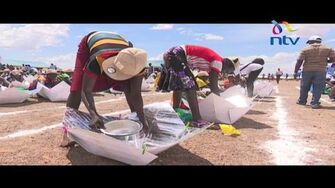
May 2017 - Kakuma refugee camp setting the pace in use of renewable energy
"Kakuma refugee camp could be setting the pace to encouraging the use of clean renewable energy not only in Kenya but the whole continent. This is after they were introduced Solar cookers that depend on sun in cooking. In the recent years, the importance of shifting to clean renewable energy has been dominating both International and Local News. NTVs Sharon Barang'a was in Kakuma and now reports how the initiative is expected to cut reliance on firewood and charcoal by half therefore honouring the principles of Geneva conventions."
Solar Cookers International’s first and largest refugee project began in January 1995 in the Kakuma Refugee Camp located in Kenya. At the time, the camp provided a safe haven for 28,000 refugees, primarily from Sudan and Somalia. The camp also housed refugees from Ethiopia, the DRC, Burundi, Eritrea, Rwanda and Uganda. Kakuma had considerable refugee turnover, but by 2004, when Solar Cookers International (SCI) concluded the project, the camp had tripled in size to nearly 90,000 refugees. Though rapid growth posed problems for assisting all those who wanted to solar cook, SCI ultimately served over 15,000 families. Beginning in 2016, new efforts have been made to bring solar cooking back to Kakuma.
Solar Cookers International began partnering with the Ecomandate Foundation in late 2018 at the Kakuma Refugee Camp in Kenya, to bring solar cooking to Kakuma families. Ecomandate brings experience, expertise, and knowledge of local customs and cooking habits to this effort. Ecomandate oversees the construction and distribution of solar cookers to residents. They implement training and follow-up to ensure successful continued use of the solar cookers. Over 1,900 Kakuma residents are now enjoying nutritious solar-cooked meals. From 2019 until mid-2022, 234 box solar cookers have been constructed in Kenya by residents, with locally sourced materials, for use by Kakuma families.
It is estimated that these solar cookers will avoid 5,229 metric tons of carbon dioxide over the cookers’ expected lifetime of 15 years. Solar cooking allows Kakuma residents to breathe cleaner air, drink safer water, and experience increased safety and opportunities for women and children. Efforts to increase the use of solar cookers continue in Kakuma and these impacts and figures will grow.
Most significant solar cooking projects[]
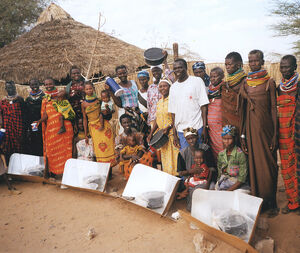
Refugees from Sudan are trained by Solar Cookers International in the use of their new CooKit solar cookers.
- A refugee camp in Kenya was the first to receive a large scale solar cooking project - The Kakuma refugee camp was formed in 1972 when Sudanese refugees first arrived in Kakuma, Kenya. Introducing solar cooking to the camp was Solar Cookers International’s first and largest refugee project, beginning in January 1995. Kakuma had considerable refugee turnover, but by 2004, when Solar Cookers International (SCI) concluded the project, the camp had tripled in size to nearly 90,000 refugees. Though rapid growth posed problems for assisting all those who wanted to solar cook, SCI ultimately served over 15,000 families. The program also extended solar cooker technology to schools, especially primary school, through demonstrations, poems, songs and drama.
News[]
- March 2023: Coming Soon! - The 6-month Haines Solar Cooker training follow up will be held in a community setting in the Kakuma Refugee Camp by the end of March. The officers elected at the training, will be organized by Mlasi Mialano and will survey the group on solar cooking usage, adoption, problems and solutions. The group will select a meal to cook together, review solar cooking practices, realities, and discuss how the group can begin to train others (train the trainer) within the Kakuma Refugee Camp. Utilizing their skill and connecting with other solar cooks within the camp were goals determined in the small group breakout sessions during the training. Solar Education Project founders Mary Buchenic and Jennifer Gasser, and the newest partner, Grace Chepkemei Rono, will be guest speakers at the event.
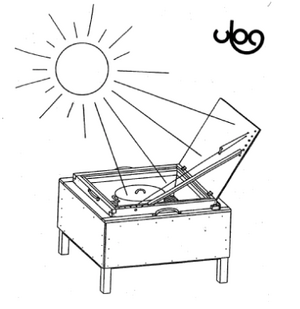
The ULOG 1.0 solar box cooker
- July 2023: Updates for 2023 - Under the partnership of Solar Cookers International and Ecomandate, 60 standard-size ULOG cookers were manufactured in Kenya, by Kenyans, using materials available in Kenya, for cooking regional foods in Kakuma. Follow-up training on solar cooking is equally as important as receiving a new cooker. Learn more about how the program is implemented in the video below.
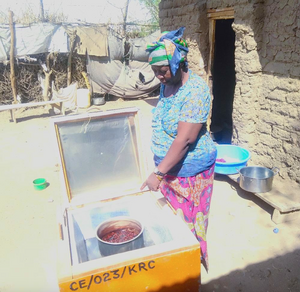
Woman examines an Ecomandate Foundation built solar box oven at the Kakuma Refugee Camp, Photo credit SCI
- March 2023: Solar Cookers International in partnership with the Ecomandate Foundation - The organizations have implemented an ongoing solar cooking project at the Kakuma Refugee Camp in Kenya. Solar Cookers International emphasizes and applies best practices in project development and project monitoring and evaluation. Ecomandate Foundation brings hands-on construction, their local experience as part of the community, and familiarity with local customs and practices, and local languages. Read more...
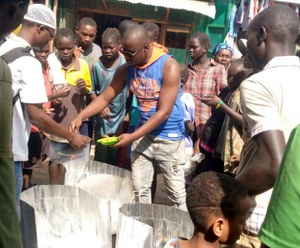
Kihuha Bruno demonstrates a Haines panel cooker by preparing a meal at the Kakuma Refugee Camp, Photo credit: Kihuha Bruno
- December 2022: Kihuha Bruno has been a long time advocate of using solar cooking, particularly with those having limited resources. He has worked frequently at the Kakuma Refugee Camp in Kenya demonstrating the effectiveness of Haines Solar Cookers, thereby avoiding deforestation from firewwood collection, and respiratory illness from using open fires for cooking.
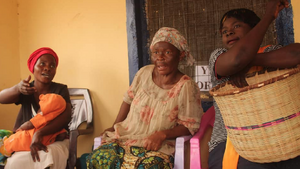
The Solar Education Project reports that Grace Chepkemei shared her skill and knowledge about solar cooking and heat-retention basket cooking, Photo credit: Solar Education Project
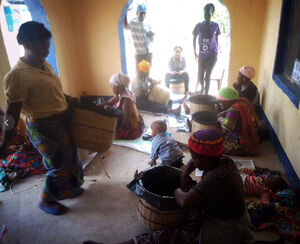
Heat-retention cooking baskets were constructed at the workshop.Photo credit: Solar Education Project
- May 2022: Solar and heat retention cooking workshop - The Solar Education Project reports that Grace Chepkemei shared her skill and knowledge about solar cooking and heat-retention basket cooking at a workshop at the Kakuma Refugee Camp. These skills demonstrate how the Integrated Cooking Method will benefit the trainees and community.
- January 2022: Focus groups in refugee camps - Roger Haines reports that Haines Solar Cookers has been organizing three simultaneous “focus group” projects for 10 women in each of three refugee camps: Dadaab and Kakuma (in Kenya) and Palabek Refugee Community (in Uganda). Materials to make about 250 Haines 2.0 “pop-open” cookers are already in each Camp. These are the original “wrinkly” MPET rolls that I imported into Kenya in 2014, so we must tape three pieces together to make the new one-piece “pop-open” design. We will not order new one-piece reflectors until we obtain reports from the focus groups. The Alliance for African Assistance-Kenya has identified and will soon hire the lead trainers, who are themselves refugees well-connected with each Camp. We will start small and make sure we have the right design and the right partners in each camp before scaling up.
- November 2020: SCI shares successes at the ReEnergy Africa E-Summit - SCI's Executive Director Caitlyn Hughes discusses the impact of solar cooking around the world and shared success stories from Kakuma Refugee Camp, Kenya. Watch video
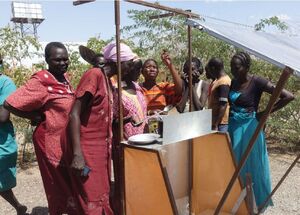
Refugee women with a Heliac Solar Cooker
- June 2019: Solar Cookers International has recently brought life-saving solar cooking to more than 300 people in the Kakuma Refugee Camp. Before you stepped in, women were often forced to sell their precious food rations for cooking fuel, putting their children at risk of malnutrition. If they dared to journey outside of the camp to collect firewood, they risked violence.
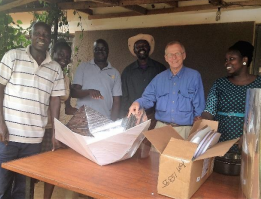
Roger Haines meets with the Alliance for African Assistance to discuss distributing solar cookers in Uganda. - Photo credit: Roger Haines
- October 2017: Dedicated solar cooking proponent visits Kenya and Uganda - Roger Haines, CEO of Haines Solar Cookers, spent most of the first half of 2017 by attending and networking at the 6th SCI World Conference 2017 in India, and then traveling throughout central Africa to promote various solar cooking projects. The seeds for the Kakuma festival began at the conference. See more about the festival in April news below. Next he met with solar cooker entrepreneurs Camily Wedende, Dinah Chienjo, and John Amayo in Nairobi, Kenya, and then toured the situation in Uganda. He met with the Alliance for African Assistance in Gulu to find ways to distribute subsidized Haines Solar Cookers. At the end of April he was back in Kenya at the Kakuma Refugee Camp to help with the planned festival. Faustine Odaba was on hand to help the student participants use their new solar cookers to best effect. Read in more detail about Roger's trip at: Roger Haines trips to India and Africa, 2017
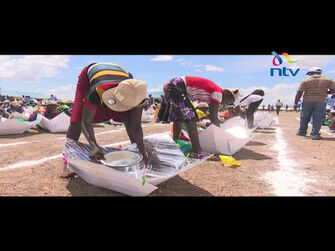
Kakuma refugee camp setting the pace in use of renewable energy
- April 2017: On April 29, 2017, a solar cooking festival for 500 schoolchildren was held at Kakuma Refugee Camp in Kenya. The idea was originated by three of the participants at the 6th SCI World Conference 2017, put on in January by Solar Cookers International in Gujarat, India. Roger Haines, CEO of Haines Solar Cookers, Ritesh Raithatha, CEO of Simplified Technologies for Life, and Godfrey Mawira Kaburu, an engineer with the World Food Program in Nairobi. At the Gujarat conference, Godfrey presented the results of his study showing that in October, 2016, solar cooking was the second-most preferred method of cooking at the Kakuma Refugee Camp, even though very few solar cookers were available. To create an inexpensive, durable cooker for the festival, Roger collaborated with Sharon Clausson, designer of the Copenhagen Solar Cooker, to design a “Haines-Copenhagen” cooker using Roger’s metallized polyester (MPET) foam reflector, and a UV-resistant polycarbonate Haines Cooking Sleeve. The cookers were made in Kakuma by refugees from materials donated by Haines Solar Cookers, and should last 10 years with proper care. Ritesh’s company, Simplified Technologies for Life, has produced “Suryakumbh” solar cooking festivals for almost 120,000 participants in India, and holds the Guinness Record for the most people solar cooking at the same time: 7,438. Ritesh and his colleague, Vivek Kabra, provided expertise and leadership for the festival. Godfrey put together a team of experts, including Mwenda Wilkinson, who handled the logistical, financial, and personnel details. The National Council of Churches of Kenya (NCCK) generously donated the services of Raphael Nyabala and Wilson Kinyua and many others to recruit the children and provide facilities and transportation. Funding was provided by Haines Solar Cookers and the San Diego, California, Rotary Club. Additional support and resources came from Solar Household Energy (SHE), a Washington, DC solar cooking organization. Other partners included Eco-Mandate, which sells solar cookers in Chuka, Kenya, the Alliance for African Assistance, a San Diego-based refugee resettlement organization, and the Rotaract Club of the University of California, San Diego, which made 500 Water Pasteurization Indicators (WAPIs) for the Festival participants. Training was provided by Faustine “Mama Solar” Odaba, and her Nairobi NGO, NAREWAMA. Significantly, Ms. Odaba had been one of the trainers in 1995 when SCI first introduced solar cookers in Kakuma. Before the festival, 50 refugee women were trained to use the cookers, and they in turn trained the children. The festival took place at Hope Primary School in Kakuma Camp Four. During the festival, “Mama Solar” set up fifteen cookers and cooked a wide variety of food, including rice, vegetables chicken, eggs, cabbage, ugali, beans and cake. The children sat in neat rows as trainers handed out the cookers, cooking pots, food and water. Each child assembled their own cooker, and successfully cooked delicious noodles before an enthusiastic crowd of family members and relatives. The children were elated and proudly showed off their new cookers. Follow up studies are planned, and Roger Haines is working with a local entrepreneur to offer Haines-Copenhagen solar cookers for sale in Kakuma for a sustainable price of around $25 USD.
- September 2016: Renewed solar cooking workshops at Kenyan refugee camps - Solar cooking advocate, Faustine Odaba, and her daughter have been conducting solar cooking and fireless cooking workshops at the Kakuma and Dadaab refugee camps in Kenya. The has been an enthusiastic response to thee workshops as participants prepare for the time when Kenya closes the camps.
- Faustine Odaba solar cooking workshop at refugee camps in KenyaFaustine Odaba solar cooking workshop at refugee camps in KenyaFaustine Odaba solar cooking workshop at refugee camps in Kenya
- September 2012: The Swedish Church and the aid agency Lutheran World Federation (LWF) are launching Solvatten in Kakuma Refugee Camp in Kenya. The goal of the project is to reduce environmental degradation by enabling people to use alternative sources of energy in the camp and in the host community that surrounds it.
Supply of firewood has been a problem in Kakuma region since the camp was set up in 1992 but it has escalated in the past two years, despite that the refugees are not allowed to harvest firewood directly from the bushes. This is attributed to the continuous massive influx of people into the camp leading to the environmental degradation through the harvesting of sticks from the available vegetation for firewood. Firewood has become very expensive and the UNHCR struggles to purchase and supply fuel to the growing population of refugees in the camp.
Documents[]
- February 2018: Prices, Products and Priorities Meeting Refugees’ Energy Needs in Burkina Faso and Kenya - Practical Action
- May 2017: Solar Cooking—the solution to environmental impact and fuel scarcity in Kakuma Refugee Camp - Godfrey Mawira Kaburu
- February 2005: Report from Kakuma Refugee Camp - Antony Malong
- December 2003: Independent Project Evaluation - The evaluation of SCI’s Solar Cooking project at Kakuma Refugee Camp was commissioned by SCI primarily to exhaustively review the entire solar cookers project from inception to the present, in anticipation of its phase out and eventual replacement by a refugee trainer operated cooperative. The evaluation is in line with SCI’s procedures, much like other development agencies, which highlight the processes, impact and lessons learnt from development projects.
Audio and video[]
- July 2023:
- May 2017:

